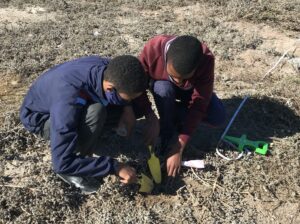The Iimbovane Project team took a trip to Saldanha where they gave learners from Diazville High School a practical experience of biodiversity.
The Life Science curriculum requires learners to understand the theory of biodiversity, but also to gain practical skills such as as measuring, making observations, using sampling methods and recording data. However, educators and schools are not always equipped to perform such practical investigations.
This is where the Iimbovane Project team steps in, taking learners out to the field to sample the ants in their own school grounds and giving them the opportunity to develop these practical scientific skills.
The Iimbovane Project team was welcomed by Mr Ivan Dwashu, Grade 10 Life Sciences educator at Diazville High School.
After an introductory activity in class, the learners were keen to use their practical skills to find out whether their own school ground indeed had any ants.
Mr Dwashu, who was working with Iimbovane for the first time was delighted about the practical fieldwork component and commented: “The Iimbovane Project is beneficial to Grade 10 learners as it ties in with the topic of biodiversity. It essentially shows biodiversity in action. Learners can be assessed on this topic by inserting it as a case study in an assignment or test/exam paper. It is also helpful in explaining the topic of classification as learners learn valuable skills of using scientific keys to identify ants, which can also be assessed in an assignment, test or exam.”
